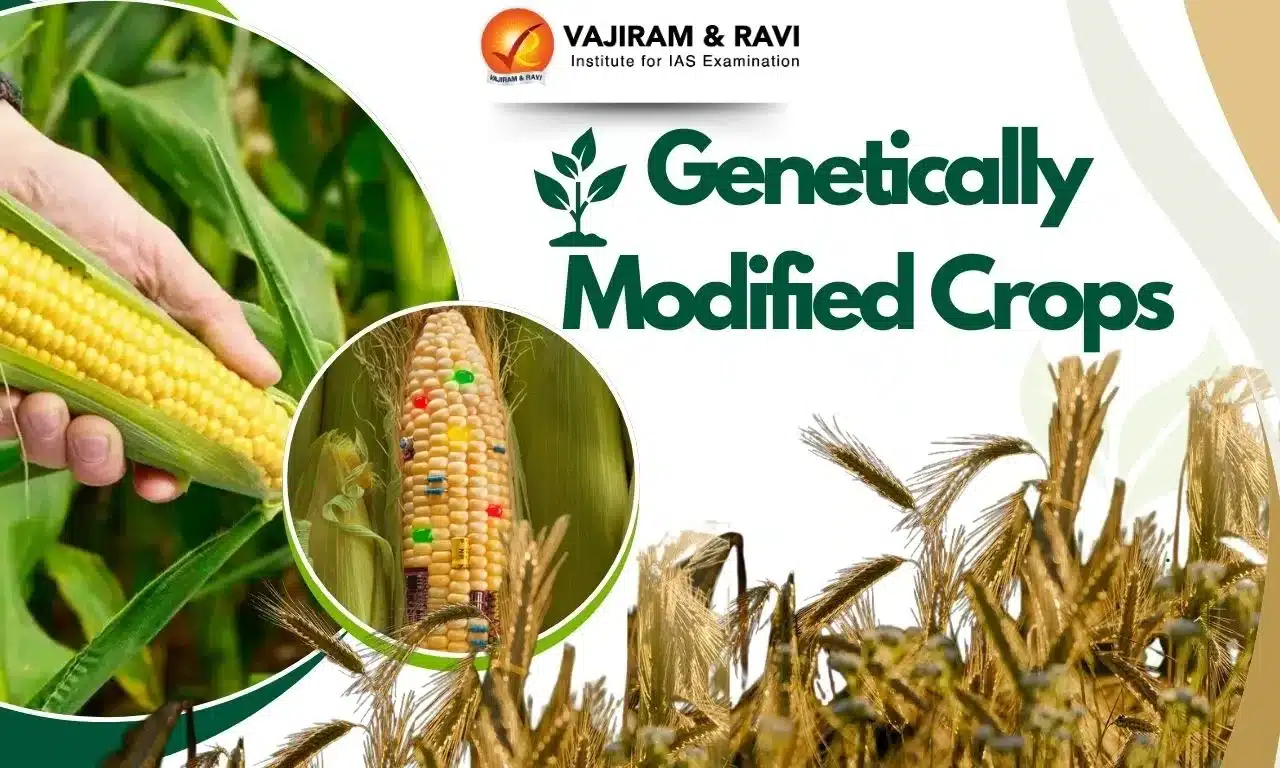What’s in today’s article?
- Why in the News?
- About Genetically Modified (GM) Crops
- Regulations w.r.t. GM Crops in India
- News Summary
Why in the News?
- The Union Ministry of Environment, Forest and Climate Change has amended the rules governing the selection of experts to the Genetic Engineering Appraisal Committee (GEAC).
About Genetically Modified (GM) Crops
- Genetically Modified (GM) crops are plants whose DNA has been altered through genetic engineering techniques to introduce desirable traits.
- These traits may include resistance to pests, diseases, or environmental conditions, improved nutritional content, or increased yield.
- Unlike traditional crossbreeding methods, genetic modification allows for the direct manipulation of a plant’s genetic material, often incorporating genes from different species to achieve specific results.
- Benefits of GM Crops:
- Increased Yield: GM crops can produce higher yields, contributing to food security.
- Pest and Disease Resistance: Crops can be engineered to be resistant to specific pests and diseases, reducing the need for chemical pesticides.
- Herbicide Tolerance: Some GM crops are designed to withstand certain herbicides, making weed control more effective.
- Enhanced Nutritional Content: Crops can be modified to contain higher levels of essential nutrients, addressing malnutrition in developing countries.
- Environmental Benefits: Reduced need for chemical inputs can lower the environmental impact of agriculture.
- Concerns / Controversies w.r.t. GM Crops:
- Environmental Impact: There is ongoing debate about the potential for GM crops to affect non-target species and lead to a reduction in biodiversity.
- Health Concerns: While extensive research indicates that GM foods are safe to eat, public concern about potential long-term health effects persists.
- Economic Issues: GM seeds are often patented, leading to concerns about corporate control over the food supply and the economic impact on small-scale farmers.
- Ethical and Labeling Issues: There are ethical debates surrounding the manipulation of genetic material, and many advocate for clear labeling of GM products to inform consumer choice.
Regulations w.r.t. GM Crops in India
- The adoption and regulation of GM crops vary globally. In some countries, GM crops are widely grown and consumed, while others have stringent regulations or outright bans.
- In India, the Ministry of Environment, Forest, and Climate Change oversees all activities, operations, and products associated with genetically modified organisms.
- These are regulated under the Environment (Protection) Act, 1986.
- The Genetic Engineering Appraisal Committee (GEAC), part of MoEFCC, has the authority to review, monitor, and approve all GMO-related activities, including import, export, transportation, manufacture, use, and sale.
- GEAC is a statutory body established under the Environment Act, 1986.
- Additionally, GM foods must comply with the regulations set by the Food Safety and Standards Authority of India (FSSAI).
- Currently, cotton is the only GM crop approved for commercial cultivation in India.
News Summary
- The Union Ministry of Environment, Forest, and Climate Change has introduced new rules mandating experts on the Genetic Engineering Appraisal Committee (GEAC) to disclose any potential conflict of interest.
- Disclosure of Conflicts:
- Expert members must disclose any direct or indirect association with matters being discussed in GEAC meetings.
- Experts are expected to recuse themselves from discussions unless specifically requested by the committee.
- Background Checks:
- Selected members must submit detailed forms listing their professional affiliations from the past decade.
- Supreme Court Directive:
- The amendments follow a Supreme Court directive from July 2023, which required the Centre to formulate a national policy on GM crops.
- The court highlighted the need for a process to address conflicts of interest after allegations surfaced regarding links between committee members and biotech companies like Monsanto (now Bayer CropScience).
- Context of GM Mustard:
- The rules come in the wake of the Centre’s controversial 2022 decision granting conditional approval for GM mustard crops.
- The Supreme Court delivered a split verdict on this decision, leaving the final resolution to a future bench.
- Significance:
- These measures aim to enhance the credibility of the GEAC by ensuring that decisions on GM crops are transparent, unbiased, and free from external influence.
- This move addresses long-standing concerns over corporate affiliations influencing policy and regulatory decisions in India’s GM crop sector.
Q1. What is glyphosate?
Glyphosate is a widely used herbicide that controls broadleaf weeds and grasses. The use of glyphosate involves health hazards and risk to human beings and animals”. It has, however, not banned and only “restricted” its use.
Q2. What is GM mustard hybrid DMH-11?
Dhara Mustard Hybrid-11, otherwise known as DMH – 11, is a genetically modified hybrid variety of the mustard species Brassica juncea. It was developed by Professor Deepak Pental from the University of Delhi, with the aim of reducing India’s demand for edible oil imports.
Source :TH
Last updated on February, 2026
→ UPSC Notification 2026 is now out on the official website at upsconline.nic.in.
→ UPSC IFoS Notification 2026 is now out on the official website at upsconline.nic.in.
→ UPSC Calendar 2026 has been released.
→ UPSC Final Result 2025 is expected to be released in the second week of April 2026.
→ Check out the latest UPSC Syllabus 2026 here.
→ Join Vajiram & Ravi’s Interview Guidance Programme for expert help to crack your final UPSC stage.
→ UPSC Mains Result 2025 is now out.
→ UPSC Prelims 2026 will be conducted on 24th May, 2026 & UPSC Mains 2026 will be conducted on 21st August 2026.
→ The UPSC Selection Process is of 3 stages-Prelims, Mains and Interview.
→ Prepare effectively with Vajiram & Ravi’s UPSC Prelims Test Series 2026 featuring full-length mock tests, detailed solutions, and performance analysis.
→ Enroll in Vajiram & Ravi’s UPSC Mains Test Series 2026 for structured answer writing practice, expert evaluation, and exam-oriented feedback.
→ Join Vajiram & Ravi’s Best UPSC Mentorship Program for personalized guidance, strategy planning, and one-to-one support from experienced mentors.
→ Check UPSC Marksheet 2024 Here.
→ UPSC Toppers List 2024 is released now. Shakti Dubey is UPSC AIR 1 2024 Topper.
→ Also check Best UPSC Coaching in India




















